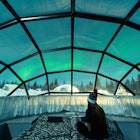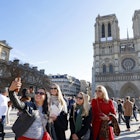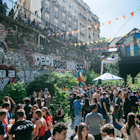

The canal Saint-Martin, a classic filming location in Paris. Laurent Yokel / Getty Images
Cinema is known as le septiУЈme art (the 7th art) in France, and Paris has played a starring role in its evolution, today hosting some 900 film shoots per year. Experience cinematic Paris and discover famous film locations, visit Parisian and national film archives, take a behind-the-scenes tour of an art-deco theatre, and catch a movie in one of Paris' trove of atmospheric cinemas.
The places where the LumiУЈre brothers started cinema
Cinema's beginnings took place south of the capital in the French city of Lyon, when on 19 March 1895, brothers Auguste and Louis LumiУЈre shot the first reels of the world's first motion picture, La Sortie des Usines LumiУЈres (Exit of the LumiУЈres Factories) showing workers leaving their photographic-plate factory (now a museum).
The LumiУЈre brothers took their film to Paris, where they held a private screening on 22 March 1895 at the SociУЉtУЉ dтEncouragement У lтIndustrie Nationale (Society for the Development of the National Industry) with an audience of 200 conference attendees. Later that year, on 28 December 1895, the brothers went on to stage world's first paying public film screening in the basement Salon Indien du Grand CafУЉ on boulevard des Capucines in the 9e arrondissement, showcasing 10 short films including La Sortie des Usines LumiУЈres. The site is now part of the ; an inscription on the building's facade details its history.

Where to see iconic film sights in Paris
In the heart of the city, deep in the underground shopping mall/transport hub Forum des Halles, 1er, Paris' film archive, Forum des Images, was set up in 1988 as an 'audiovisual memory bank' of the city, with a library and research centre preserving newsreels, documentaries and advertising from over the years. The centre's five-screen cinema shows films set in La Ville LumiУЈre (the City of Light).
Far from the typical tourist track in the 12e, you'll find the film institute CinУЉmathУЈque ЙѓАљВЙВдУЇВЙОБВѕe. Its permanent collection contains costumes, vintage equipment and posters, film clips and props. Among them are some from the 1902 silent film Le Voyage dans la Lune (The Trip to the Moon), the first-ever science-fiction film, by Paris magician Georges MУЉliУЈs, who was among the spectators at the LumiУЈre brothers' screening; Martin Scorsese featured Le Voyage dans la Lune in his Oscar-winning 2011 film, Hugo. The CinУЉmathУЈque also mounts temporary exhibitions that take an in-depth look at a film or creator. Its on-site cinema screens original-language films including retrospectives of famous filmmakers and artists.

Paris' landmark cinemas
Paris has scores of cinemas, with an estimated screen per every 6000 inhabitants at last count, including numerous art house and independent theatres.
Art deco landmark Le Grand Rex, in the 2e, is a listed historical monument that retains its 1932 decor. You still see films and cinУЉ-concerts with orchestras in its seven salles (screening rooms), including its triple-tiered, 2700-plus-seat Grande Salle; take a guided tour, or a fantastic audio-guided, behind-the-scenes tour through the projection room and recording and special effects studios. Kids love it.
Another listed historical monument (dating from 1921), the neo-Egyptian art deco cinema Le Louxor, 10e, also has piano-accompanied cinУЉ-concerts; check the calendar for their short-film festivals, workshops and live-music performances. Itтs a scenic view from the terrace overlooking Montmartre's basilica, SacrУЉ-CХur.
Behind the Rodin-sculpted facade of a 19th-century theatre, the Fondation JУЉrУДme Seydoux-PathУЉ, 13e, was overhauled by renowned architect Renzo Piano in 2014. Silent black-and-white films are accompanied by a live pianist; it also has an exhibition covering cinematic history. Also in the 13e, CinУЉma Les Fauvettes screens silent-era and contemporary films.
The Latin Quarter, 5e, has a wealth of cinemas, from art deco treasures like Le Champo (known for timeless classics) to Le Grand Action (cult films) and The Rocky Horror Picture Show stalwart Studio Galande, which has screened the iconic 1975 sci-fi horror-comedy every weekend for four decades.
Paris' most anticipated cinematic reopening is historical monument La Pagode, a 19th-century Japanese pagoda shipped to France, piece by piece, in 1895 by the then-proprietor of department store Le Bon MarchУЉ; he had the pagoda rebuilt in his bamboo-filled garden on rue de Babylone, 7e. Converted into a cinema in the 1930s, it was beloved by generations of Parisian film-goers before financial difficulties forced it to close in 2015. Salvation came in 2017 when New York producer and French-film aficionado Charles Cohen stepped in. Following an тЌ8 million restoration that will preserve the pagoda and garden and add a third salle in its basement, it will reopen in 2020.
For session times at cinemas Paris-wide, check . Foreign films (including English-language films) screened in their original language with French subtitles are labelled 'VO' (version originale). Films that are labelled 'VF' (version franУЇaise) are dubbed in French. Alternatively, you can catch new-release French films with English subtitles at events held by at independent cinemas with pre- or post-screening cocktails.

Film festivals in Paris
Paris' love of cinema is reflected in its array of film festivals.
French and international documentary films screen in and out of competition during late March's 10-day at venues including the Centre Pompidou. Around early July, selected cinemas across Paris offer filmgoers a flat, low-cost entry fee per session over four days during . From mid-July to mid-August, free film screenings take place under the stars in Parc de la Villette during the . In August, short films by independent film-makers screen in competition alongside open-air concerts and workshops during the nine-day festival .
Classic filming locations in Paris
Paris is the backdrop for countless French and foreign-made films. Classics span Parisian filmmaker Marcel CarnУЉ's HУДtel du Nord (1938), set along Canal St-Martin, to New Wave director Jean-Luc Godard У Bout de Souffle (Breathless; 1960), partly filmed on the av des Champs-УlysУЉes. Or there's the James Bond installment A View to a Kill (1985), with a spectacular jump from the Eiffel Tower; Les Amants du Pont-Neuf (The Lovers on the Bridge; 1991), set against the city's oldest bridge; Jean-Pierre Jeunetтs Le Fabuleux Destin dтAmУЉlie Poulain (Amelie; 2001), about a Montmartre cafe waitress; Richard Linklater's Before Sunset (2004), which opens at magical bookshop Shakespeare & Company; Ron Howard's The Da Vinci Code (2006), with action taking place at the Louvre and Уglise St-Sulpice; Sofia Coppola's Marie-Antoinette (2006), filmed at the ChУЂteau de Versailles; Woody Allen's Midnight in Paris (2011), in which Owen Wilson's character is transported back to Hemingway's 1920s Paris from outside the Уglise St-Уtienne du Mont; and Wash Westmoreland's Colette (2018), featuring scenes outside the Moulin Rouge.
For a neighbourhood-by-neighbourhood overview of famous settings, check the Paris Convention and Visitors Bureau's .
Make the most of your travel with sightseeing tours and activities from our trusted partners.
Explore related stories


 Cultural SiteAll you need to know about visiting CathУЉdrale Notre-Dame de Paris
Cultural SiteAll you need to know about visiting CathУЉdrale Notre-Dame de ParisDec 5, 2024 тЂ 10 min read
 Architecture10 best castles in France: from formidable forts to lavish riverside chУЂteaux
Architecture10 best castles in France: from formidable forts to lavish riverside chУЂteauxDec 1, 2024 тЂ 14 min read
 Festivals & Events8 of the best cities in Europe to celebrate New Yearтs Eve
Festivals & Events8 of the best cities in Europe to celebrate New Yearтs EveNov 6, 2024 тЂ 7 min read
 ArchitectureNotre Dame reveals December opening date amid debate over entry fee
ArchitectureNotre Dame reveals December opening date amid debate over entry feeOct 31, 2024 тЂ 5 min read
 Art and CultureFrance itineraries: 5 routes to see the best of the country
Art and CultureFrance itineraries: 5 routes to see the best of the countryOct 24, 2024 тЂ 13 min read

 Art and Culture3 days in Paris: the ultimate itinerary (when you've done the Louvre and the Eiffel Tower)
Art and Culture3 days in Paris: the ultimate itinerary (when you've done the Louvre and the Eiffel Tower)Aug 23, 2024 тЂ 8 min read


